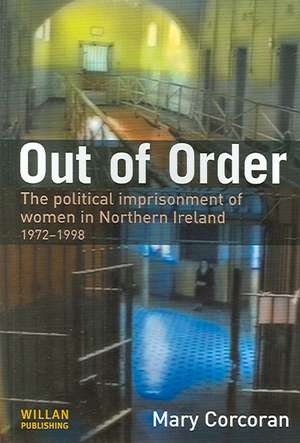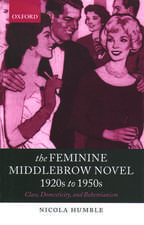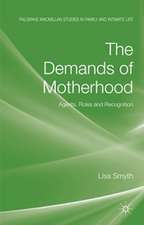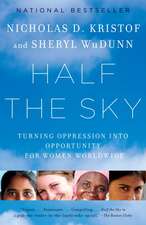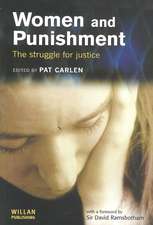Out of Order
Autor Mary Corcoranen Limba Engleză Paperback – feb 2006
Out of Order brings out the qualitatively distinctive character and punitive ethos of regimes of political imprisonment for women, exploring the dynamics of their internal organisation, the ways in which they subverted order and security in prison, and their strategies of resistance and exploitation. Drawing upon a wide range of first hand accounts and interviews this book brings together perspectives from the areas of political imprisonment, the penal punishment of women and the question of agency and resistance in prison to create a unique, highly readable study of a neglected subject.
Preț: 261.54 lei
Preț vechi: 312.22 lei
-16% Nou
Puncte Express: 392
Preț estimativ în valută:
50.04€ • 52.25$ • 41.42£
50.04€ • 52.25$ • 41.42£
Carte tipărită la comandă
Livrare economică 04-18 aprilie
Preluare comenzi: 021 569.72.76
Specificații
ISBN-13: 9781843921622
ISBN-10: 1843921626
Pagini: 288
Dimensiuni: 156 x 234 x 22 mm
Greutate: 0.53 kg
Ediția:1
Editura: Taylor & Francis
Colecția Willan
Locul publicării:Oxford, United Kingdom
ISBN-10: 1843921626
Pagini: 288
Dimensiuni: 156 x 234 x 22 mm
Greutate: 0.53 kg
Ediția:1
Editura: Taylor & Francis
Colecția Willan
Locul publicării:Oxford, United Kingdom
Cuprins
Introduction 1. Violence, laws and commissions: preparing for the detention of women 2. Inside the carceral network, 1972-98 3. Paradoxes of women's political imprisonment: sociological narratives and closures 4. The dynamics of punishment and resistance in Northern Ireland's prisons 5. 'Nor meekly serve our time': a continuum of resistance 6. 'Making space for ourselves': reconstructing a prison community 7. 'We are not criminals': political identity as resistance 8. The turning of the screw: active disengagement, intimidation and the conditioning of staff 9. 'Our bodies are weapons of war': a penal dialectic of the body 10. 'Working with the system': resistance in the context of 'normalization', 1986-1998 11. 'Turningthe place inside out': extending the constituency of prison struggle 12. Conclusion: 'Doing your time right' - penal pain, resistance and survival
Notă biografică
Mary Corcoran is a Lecturer in Criminology at Keele University. Some of her recent publications include: 'Normalization and its discontents - Constructing the 'irreconcilable' female political prisoner in northern Ireland'. British Journal of Criminology, vol. 47(3), 405-422 (2007); '"Talking about resistance": women political prisoners and the dynamics of prison conflict, Northern Ireland' in Expanding the Criminological Imagination: Critical Readings in Criminology, Barton A, Corteen K, Scott D, Whyte D eds (Willan, 2006).
Recenzii
Mary Corcoran’s Out of Order: the Political Imprisonment of Women in Northern Ireland 1972-1998, provides a significant and valuable contribution to the currently limited academic analyses on women’s political imprisonment in Northern Ireland. There remains a dearth of research on this minoritized population of women despite the fact that a wealth of research on the political imprisonment of men in Northern Ireland has been conducted (McEvoy, 2001; McKeown, 2001). In fact, while protests by men prisoners in the H-Block during the 1970’s and 1980’s are well documented, Corcoran’s analysis presents the first detailed documentation of protests by women prisoner’s in Armagh Prison and in the Mourne House Unit of Maghaberry Prison during the period of time well known as ‘the troubles’. Corcoran traces a history of the present, by charting the evolution of the punishment of female political prisoners in Northern Ireland over a 26-year period. To do this, she structures her account according to the three key stages of prison administration and penal regimes that she identified as operating in Armagh Prison during this time frame: reactive containment (1969-76), criminalization (1976-1981), and normalization (1982-1998). During the criminalization period, the women resisted the removal of their political status in prison by engaging in a ‘dirty protest’ (refusing to bathe, smearing their cells with feces and menstrual blood). In addition, and despite the Provisional IRA orders against it, the women participated in a nearly year long hunger strike, both to resist and demonstrate their agency as political prisoners and to show their solidarity with and support of their male counterparts in H-Block. Unique to this analysis, is that the author exposes how the women’s acts were demonstrative not only of their resistance to the removal of their political status, but also to the gendered mistreatment they experienced as women prisoners.During the later years of the normalization phase of prison administration, women political prisoners in Armagh Prison adopted a neo-liberalistic approach to resistance, by employing formal legal litigation against the administration due to discrimination they experienced with respect to their prison conditions, rights, and the campaigned use of strip-searching. Despite engaging with the reigning entrepreneurial and neo-liberal governing strategy that continues to dominate the correctional landscape, resisting the structure and control of the prison through legal means was negatively reconstructed by prison officials as a mere tactic used to cause disruption in the prison. Women political prisoners were reconstructed in mangerialistic terms, not as self-governing agents or unsatisfied clients of a correctional service, but as “opportunistic litigants and political agitators†whose legal demands were no more than selfish requests for a minority population of violent women prisoners (p.207). In this text, the author provides a well-balanced and nuanced analysis of the strategies employed by the women in their struggles to resist, demonstrate agency, as well as their relationships with prison authorities and staff. By highlighting the dual purpose and nature of the women’s acts of resistance, and drawing heavily on the theoretical propositions of feminist criminologists Kelly Hannah-Moffat, Pat Carlen, and Mary Bosworth, Corcoran demonstrates that the women’s narratives of resistance alternate between their roles as penal subjects and resisting agents, as dangerous women and women in danger, as survivors, and ultimately as agents attempting to secure collective prison transformation (p.222). While Corcoran’s analysis significantly adds to the broader theoretical framework of governance literature, her text may not be accessible to the very women she is writing about. Out of Order is dense with theory, to the benefit of academic penologists, yet at times the voices of the women who fought so hard to be heard are missing. Despite this, Corcoran’s text provides a sensitive and thoughtful discussion of the impact of gender on the resistance and status of political prisoners during ‘the troubles’. JENNIFER M. KILTY - Simon Fraser University References: McEvoy, K. (2001). Paramilitary imprisonment in Northern Ireland: Resistance, management, and release. Oxford: Oxford University Press. McKeown, L. (2001). Out of time: Irish Republican prisoners, Long Kesh, 1972-2000. Belfast: Beyond the Pale Press.
Descriere
Drawing up on a wide range of first hand accounts and interviews, this book provides a comprehensive account of the imprisonment of women for politically motivated offences in Northern Ireland between 1972 and 1999. It brings out the qualitatively distinctive character and punitive ethos of regimes of political imprisonment for women, exploring the dynamics of their internal organisation, the ways in which they subverted order and security in prison, and their strategies of resistance and exploitation.
